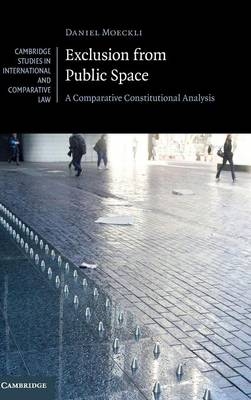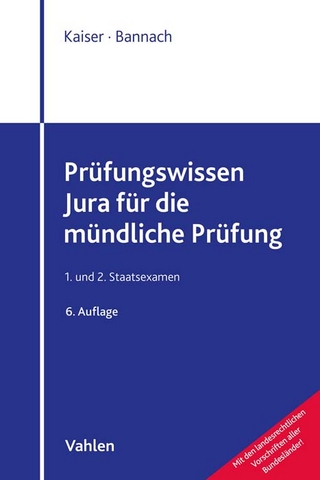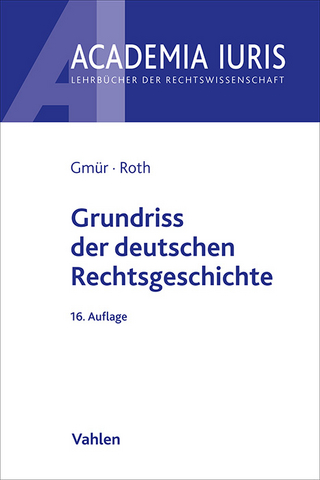
Exclusion from Public Space
Cambridge University Press (Verlag)
978-1-107-15465-0 (ISBN)
Hardly known twenty years ago, exclusion from public space has today become a standard tool of state intervention. Every year, tens of thousands of homeless individuals, drug addicts, teenagers, protesters and others are banned from parts of public space. The rise of exclusion measures is characteristic of two broader developments that have profoundly transformed public space in recent years: the privatisation of public space, and its increased control in the 'security society'. Despite the fundamental problems it raises, exclusion from public space has received hardly any attention from legal scholars. This book addresses this gap and comprehensively explores the implications that this new form of intervention has for the constitutional essentials of liberal democracy: the rule of law, fundamental rights, and democracy. To do so, it analyses legal developments in three liberal democracies that have been at the forefront of promoting exclusion measures: the United Kingdom, the United States, and Switzerland.
Daniel Moeckli is Assistant Professor of Public International Law and Constitutional Law at the University of Zurich and Fellow of the University of Nottingham Human Rights Law Centre. He is the author of Human Rights and Non-discrimination in the 'War on Terror' (2008), for which he was awarded the Paul Guggenheim Prize, and co-editor of International Human Rights Law (2014). Before joining the University of Zurich, he was a Lecturer at the University of Nottingham and worked for the International Bar Association, Amnesty International, and the Supreme Court of the Canton of Berne.
Summary contents; Contents; Abbreviations; 1. Introduction: 1.1 Exclusion from public space and its challenges to liberal democracy; 1.2 Methodology; 1.3 Scope of research; 1.4 Language and terminology; 1.5 Structure of the study; 2. Public Space and its Transformation: 2.1 The definition of 'public space' and related concepts; 2.2 Historical background; 2.3 The importance of public space; 2.4 Regulation of the use of public spac; 2.5 The transformation of public space; 2.6 Conclusion; 3. Exclusion from Public Space: 3.1 Historical background: the decline of banishment; 3.2 The resurgence of exclusion; 3.3 The targets of exclusio; 3.4 A typology of exclusion measures; 3.5 Conclusion; 4. Rule of Law: 4.1 The rule of law/Rechtsstaatsprinzip; 4.2 Principle of legality; 4.3 Requirement of sufficient precision; 4.4 Procedural safeguards and access to justice; 4.5 Conclusion; 5. Fundamental Rights: Liberty: 5.1 Fundamental and human rights; 5.2 Scope of protection; 5.3 Limitations; 5.4 Conclusion; 6. Fundamental Rights: Equality: 6.1 The right to equality and non-discrimination; 6.2 Exclusion from public space and the right to equality and non-discrimination; 6.3 Conclusion; 7. Democracy: 7.1 Democracy; 7.2 The democratic legitimacy of exclusion measures; 7.3 The consequences of exclusion measures for democracy; 7.4 Conclusion; 8. A Right (of Access) to Public Space?: 8.1 'Reclaiming public space'?; 8.2 De lege lata: is there a right to public space?; 8.3 De lege ferenda: is there a need for a right to public space?; 8.4 Conclusion; 9. Synthesis: 9.1 Conclusion: exclusion measures in conflict with liberal democracy; 9.2 Outlook: the importance of civic responsibility; Bibliography; Annex I. Overview of the most important exclusion norms; Annex II. Typology of exclusion norms.
| Erscheinungsdatum | 20.07.2016 |
|---|---|
| Reihe/Serie | Cambridge Studies in International and Comparative Law |
| Verlagsort | Cambridge |
| Sprache | englisch |
| Maße | 160 x 235 mm |
| Gewicht | 990 g |
| Themenwelt | Recht / Steuern ► Allgemeines / Lexika |
| Recht / Steuern ► EU / Internationales Recht | |
| ISBN-10 | 1-107-15465-0 / 1107154650 |
| ISBN-13 | 978-1-107-15465-0 / 9781107154650 |
| Zustand | Neuware |
| Haben Sie eine Frage zum Produkt? |
aus dem Bereich


